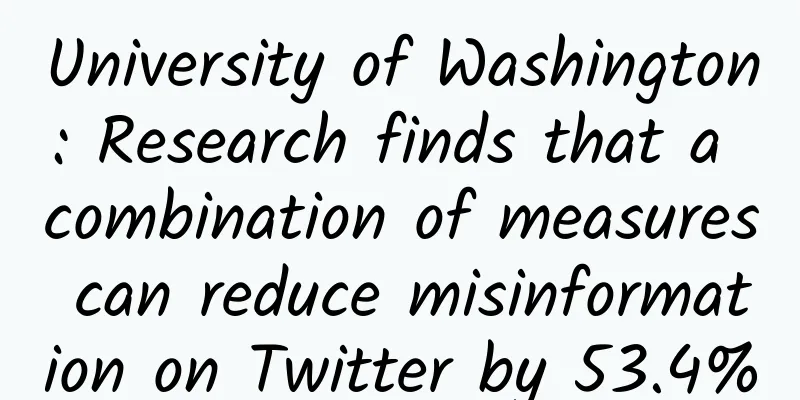University of Washington: Research finds that a combination of measures can reduce misinformation on Twitter by 53.4%

|
Social media platforms like Facebook, Instagram, and Twitter are rife with misinformation that can spread easily. After analyzing tens of millions of tweets, a new study finds that there are steps that can be taken to slow the spread of false information on Twitter. The new study, published last week in Nature, found that deplatforming repeat misinformation offenders, removing false claims and warning people about posts containing false information could reduce the amount of misinformation on Twitter by 53.4%. Jevin West, an associate professor at the UW School of Information and one of the co-authors of the paper, said these measures can all slow the spread of misinformation, but if only one measure is deployed, the effect will be discounted. The study found that by combining multiple measures, the results can be significantly improved. To determine what measures might slow viral misinformation on Twitter, the researchers looked at 23 million tweets related to the 2020 presidential election between September 1 and December 15 of that year. Each post was associated with at least one of the 544 viral events the researchers identified — defined as periods when stories exhibited rapid growth and decline. The researchers used the data to create a model similar to the infectious disease models epidemiologists use to predict the spread of infectious diseases. Through the model, the researchers were able to identify different measures, or interventions described in the study, that Twitter could apply to its platform to help stop the spread of misinformation. According to the study, the most effective was removing misinformation from the platform, especially within the first half hour after the content was posted. Also effective was kicking out repeat offenders, people who frequently share misinformation. According to Twitter's policy page, Twitter has taken some measures related to this, including making tweets from violating accounts ineligible for recommendations, preventing violating posts from appearing in searches, and moving replies from violating accounts lower in the conversation. The study also mentions nudges. These are warnings and labels used on tweets that advise people that a post contains false information. Twitter has used these widely throughout the COVID-19 pandemic for misinformation about the virus, treatments and vaccines. Twitter did not respond to a request for comment on the study. From cnBeta.COM |
<<: Daily Interaction: In 2023, Apple iPhone ranks first with 7.54% 5G market share
>>: Canalys: India's smartphone shipments to reach 38.9 million units in Q4 2023
Recommend
Small ankles with big weight
Do you know your feet? A journey of a thousand mi...
What essential oils can enhance breast size?
Modern women’s pursuit of beauty is not only abou...
Pregnancy reminder: For the sake of the child, expectant mothers should limit caffeine intake
Whether or not you should drink coffee during pre...
Can pregnant women use clotrimazole vaginal tablets?
Clotrimazole vaginal suppositories have a good ef...
Popular Science on Medication for the People - How to Identify False Drug Advertisements
Recently, a "miracle doctor" who had be...
What to eat during menstruation recipes
What food is good to eat during menstruation? Dur...
Is it necessary to give birth if the amniotic fluid is too low at 37 weeks?
The amniotic fluid of pregnant women is an import...
How much do you know about the role of isolation cream?
In daily life, most women will use isolation crea...
How to prepare for pregnancy for a boy
Now there are many families who want to have a bo...
How much weight is suitable for girls?
Many men like to use dumbbells to exercise, but n...
Do women have leucorrhea every day?
Under normal circumstances, women basically have ...
How many days after sex can I detect pregnancy test sticks
How many days can pregnancy be detected? Generall...
Symptoms of polycystic uterus
Polycystic uterus is a common disease in women. I...
How long after corpus luteum rupture can I have sex
Corpus luteum rupture is a relatively common cond...









